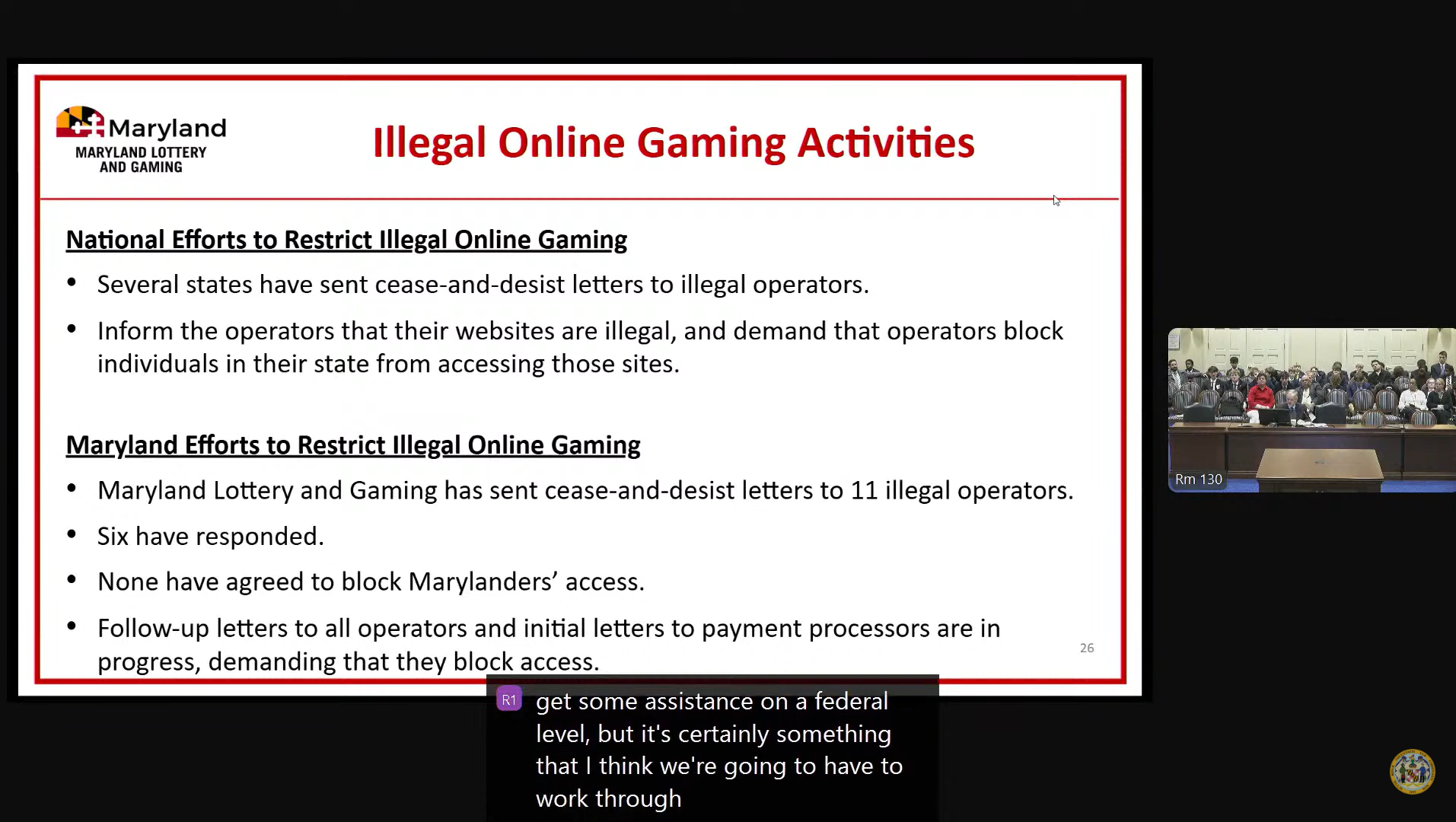
- The Maryland Lottery and Gaming Control Agency recently sent cease-and-desist letters to 11 illegal online gaming operators in the state
- The operators are a mix of sports betting and sweepstakes companies
- Letters demand operators block individuals from Maryland from accessing their sites
The Maryland Lottery and Gaming Control Agency recently announced it sent a batch of cease-and-desist letters to 11 illegally operating gaming companies in Maryland.
Maryland Lottery and Gaming Control Agency (MLGCA) Director John Martin yesterday appeared before the Maryland Ways and Means Committee and announced the efforts to block residents from accessing the illegal gaming operators. While letters went out to 11 illegal operators, only six responded and none agreed to block Maryland access.
“The concern is that the state does not benefit from any tax on the gaming revenue that’s generated by these illegal organizations…it continues to drive a wedge and drive players away from the legal operators towards illegal markets. There’s not a lot of care or consideration given to consumer protection measures, such as age verification and responsible gaming,” Martin told the Ways and Means Committee.
Mix of Sportsbooks, Sweepstakes Companies
The MLGCA sent Sports Betting Dime a list of the 11 companies that received cease-and-desist letters. The operators were a mix of illegally operating sportsbooks and sweepstakes companies in the state.
“This is an issue that we’re continuing to monitor and discuss in ongoing communications with gaming regulators in other states,” an MLGCA spokesperson told Sports Betting Dime.
The following six operators responded to the MLGCA letters, but refused to block access to Maryland residents, claiming their services were compliant with state law:
• Golden Hearts
• Zula
• MC Luck
• REBET
• Fortune Coins
• StakeUS
Letters were also sent to these five, who have not responded:
• BETUS
• BETNOW
• SlotsAndCasino
• Everygame Sportsbook
• BetAnySports
Martin said the MLGCA will continue to do follow up with with the Attorney General’s Office, stay in communication with other state gaming regulators, and potentially even receive federal assistance to block services from the illegal companies.
“Their business is not wanted or appreciated here in the state of Maryland.”
Bovada Out in Maryland
The MLGCA is not a stranger to ordering illegal operators out of its state boundaries. Maryland was one of the first states to require Harp Media B.V. and Hove Media, collectively known as Bovada, block access to its residents.
Several state regulatory gaming bodies have issued cease-and-desist letters to Bovada over the course of the last several years, ordering the offshore gaming company out of their markets. Bovada has mostly agreed to these notices, restricting access to 16 states and Washington, D.C. As was the case in all of these markets, Bovada never acknowledged the notices or told the states of their plans to restrict access.
The restricted U.S. markets are as follows:
- Arizona
- Colorado
- Connecticut
- Delaware
- Kansas
- Louisiana
- Maryland
- Massachusetts
- Michigan
- Nevada
- New Jersey
- New York
- Ohio
- Pennsylvania
- Tennessee
- Washington, D.C.
- West Virginia
In an effort to crack down on illegal sweepstakes and sports betting operators, Maryland has recently implemented stricter measures to combat these illicit activities. The state has seen a rise in illegal gambling operations in recent years, leading to concerns about the potential negative impact on communities and the economy.
One of the key measures that Maryland has put in place is increased enforcement efforts by law enforcement agencies. This includes conducting more frequent raids and investigations to identify and shut down illegal gambling operations. Additionally, the state has increased penalties for those found to be operating illegal sweepstakes and sports betting activities, with fines and potential jail time for offenders.
Maryland has also taken steps to educate the public about the dangers of participating in illegal gambling activities. This includes launching public awareness campaigns to inform residents about the risks associated with illegal gambling, as well as providing resources for those who may be struggling with gambling addiction.
Furthermore, Maryland has been working closely with neighboring states and federal agencies to coordinate efforts to combat illegal gambling operations across state lines. This collaborative approach has proven to be effective in identifying and dismantling large-scale illegal gambling networks.
Overall, Maryland’s efforts to implement stricter measures against illegal sweepstakes and sports betting operators are aimed at protecting residents from the potential harms of illegal gambling activities. By increasing enforcement efforts, raising awareness, and collaborating with other agencies, the state is taking proactive steps to ensure the integrity of its gaming industry and safeguard the well-being of its residents.